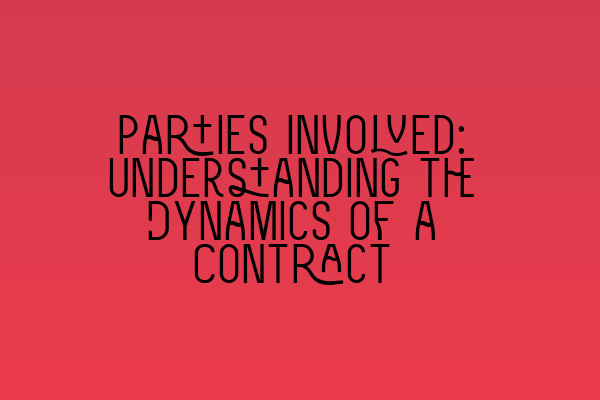Parties Involved: Understanding the Dynamics of a Contract
Contracts are the backbone of any business transaction. Whether you’re a small business owner, an entrepreneur, or an individual entering into an agreement, understanding the dynamics of a contract is crucial for protecting your rights and interests. In this article, we will explore the parties involved in a contract and their roles and responsibilities.
1. The Offeror
The offeror is the party who initiates the contract by making a proposal or offer to the other party. This party outlines the terms and conditions of the agreement and expresses their intention to be bound by it. The offer must be clear, definite, and communicated to the other party.
It’s important for the offeror to have a solid understanding of contract law to ensure that their offer is legally valid and enforceable. They should consult a legal expert or solicitor to draft the offer in a way that protects their rights and avoids any ambiguity.
2. The Offeree
The offeree is the party who receives the offer and has the power to accept or reject it. Once the offeree receives the offer, they can either accept the terms and conditions or propose a counteroffer. It’s important to note that a counteroffer constitutes a new offer, which the original offeror can accept, reject, or negotiate further.
In certain cases, the offeree may have the option to revoke or withdraw their acceptance before it is communicated to the offeror. It’s crucial to consult a solicitor to understand the specific rules and requirements for acceptance and revocation in your jurisdiction.
3. Consideration
Consideration refers to something of value that each party gives or promises to give in exchange for the other party’s promise. It could be money, goods, services, or anything else that has a legal value. Consideration is an essential element of a contract and ensures that there is mutual exchange and commitment between the parties.
It’s important to clearly identify and define the consideration in the contract to avoid misunderstandings or disputes in the future. Working with a solicitor can help you draft a contract that clearly outlines the consideration and its terms.
4. Legal Capacity
For a contract to be valid and binding, all parties involved must have the legal capacity to enter into the agreement. This means they must be of legal age, mentally competent, and not under the influence of any duress or undue influence.
It’s crucial to verify the legal capacity of the parties involved to safeguard the enforceability of the contract. If there are any concerns about capacity, consult a solicitor to ensure that the contract is legally valid and binding.
5. The Importance of Legal Advice
Contracts can be complex and have long-term implications. It’s always advisable to seek professional legal advice before entering into any contractual agreement. A solicitor specializing in contract law can provide valuable insights, protect your rights, and help you draft a contract that meets legal requirements and protects your interests.
If you’d like to learn more about contract law, we recommend reading the following related articles:
- Exploring the Impact of Frustration on Contractual Obligations: Legal Insights
- Interpreting Contractual Clauses: Unlocking the Hidden Meanings
- Legal Aspects of Business Contracts: Key Considerations for Entrepreneurs
- SQE Contract Law vs. Traditional Qualifications: A Comparative Analysis
- Agreements in Contract Law: Understanding Its Various Types
Remember, understanding the dynamics of a contract and seeking legal advice can help you navigate the complexities of contract law and protect your rights and interests. Don’t hesitate to consult a solicitor to ensure that your contracts are legally sound and enforceable.
